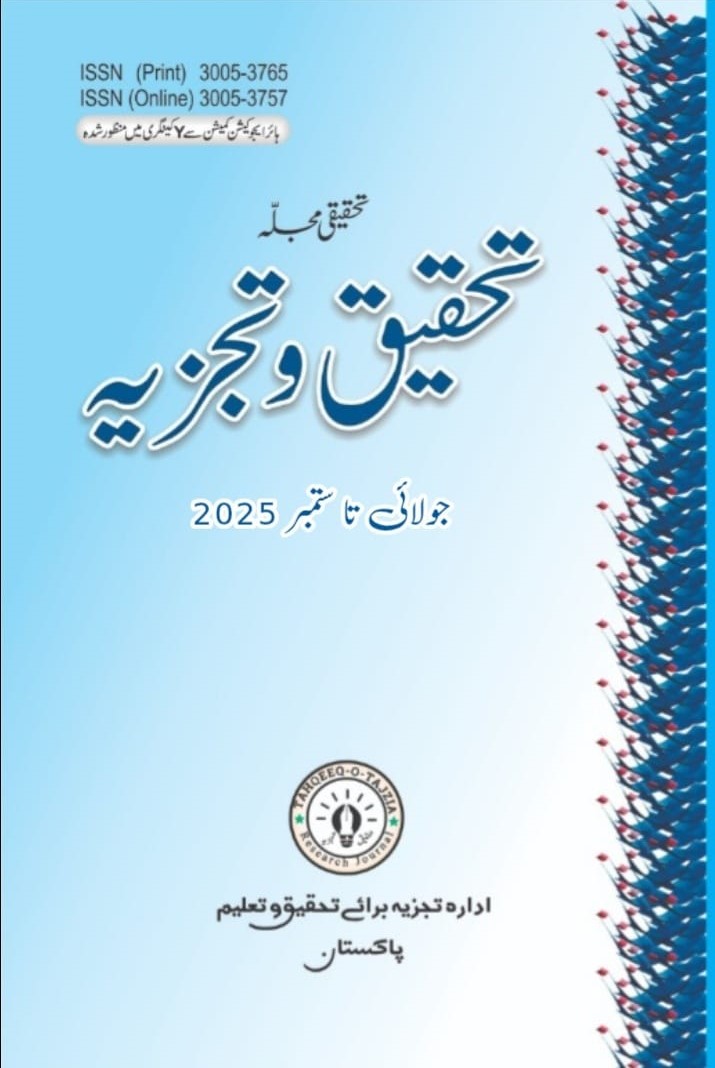“Integrating Artificial Intelligence in Urdu Language Pedagogy: Opportunities, Classroom Practices, and Critical Analysis”
Keywords:
Artificial Intelligence, Language Skills, Urdu Teaching, Teacher Training, 21st Century Pedagogy, ChatGPT, ChatbotAbstract
This action research investigates the responsible and critical integration of Artificial Intelligence (AI) in Urdu language teaching, addressing the scarcity of empirical, classroom-based studies in low-resourced languages. Five AI-supported activities were designed and implemented in university-level Urdu courses, using ChatGPT and Notebook LM to enhance speaking, writing, listening, and reading. Observations revealed improved vocabulary accuracy, interpersonal writing, self-correction, and active listening. Findings emphasize that effective integration requires teachers’ linguistic proficiency alongside technical and pedagogical expertise. This action research highlights that when AI is combined with traditional teaching methods, classrooms become more dynamic, learner-centered, and cognitively engaging. The study offers concrete, replicable models for AI use in Urdu classrooms, with implications for other less-commonly-taught languages.
References:
https://www.cnbc.com/2025/08/04/openai-chatgpt-700-million-users.html Retrieved on Aug 10, 2025, 8:55 PM
Arvind Narayanan, Sayash Kapoor, AI Snake Oil: What Artificial Intelligence Can Do, What It Can’t, and How to Tell the Difference, Princeton University Press, 2024, ISBN 069124913X, 9780691249131
Karataş, Tamer, Aydin Kilickaya, and Rüya Özkan. “Incorporating AI in Foreign Language Education: An Investigation into ChatGPT’s Effect on Foreign Language Learners.” Education and Information Technologies, 2024, https://doi.org/10.1007/s10639-024-12574-6
Zhu, M., and C. Wang. A Systematic Review of Artificial Intelligence in Language Education from 2013 to 2023: Current Status and Future Implications. 2024. SSRN, https://doi.org/10.2139/ssrn.4684304
Du, J., and B. K. Daniel. “Transforming Language Education: A Systematic Review of AI-Powered Chatbots for English as a Foreign Language Speaking Practice.” Computers and Education: Artificial Intelligence, vol. 6, 2024, 100230, https://doi.org/10.1016/j.caeai.2024.100230.
Alharbi, Wael. “AI in the Foreign Language Classroom: A Pedagogical Overview of Automated Writing Assistance Tools.” Education Research International, vol. 2023, 2023, pp. 1–15. https://doi.org/10.1155/2023/4253331.
Sabri, Sherzad, Sakar Rahman, Dalia Najeeb, Sherwan Ameen, and Sherzad Ali. “Artificial Intelligence in TESOL: A Review of Current Applications in Language Education and Assessment.” Journal of TESOL Studies, vol. 7, 2025, pp. 384–97.
Barrot, Jessie S. “Using ChatGPT for Second Language Writing: Pitfalls and Potentials.” Assessing Writing, vol. 57, 2023, 100745. https://doi.org/10.1016/j.asw.2023.100745.
Zhu, M., and C. Wang. “A Systematic Review of Artificial Intelligence in Language Education: Current Status and Future Implications.” Language Learning & Technology, vol. 29, no. 1, 2025, pp. 1–29. https://hdl.handle.net/10125/73606.
Abdelhalim, S. M., and R. Alsehibany. “Integrating ChatGPT for Vocabulary Learning and Retention: A Classroom-Based Study of Saudi EFL Learners.” Language Learning & Technology, vol. 29, no. 1, 2025, pp. 1–24. https://doi.org/10.64152/10125/73635.
Yaseen, Muhammad Khurram. “Artificial Intelligence and Urdu Language & Literature: An Analysis of Possibilities and Challenges.” Bunyad: A Journal of Urdu Studies, 2024, https://bunyad.lums.edu.pk/website/journal/article/667c376280d83/page.
Downloads





